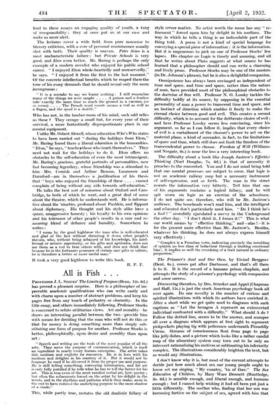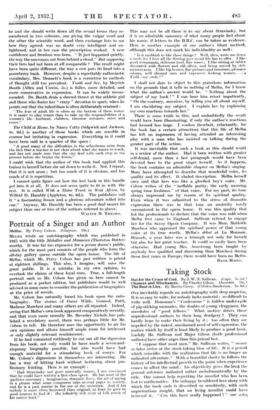Discovering Oursekes, by Drs. Strecker and Appel (Chapman and Hall,
15s.) is just the stock American psychology book all over again. Its one novelty is the number of curious and spirited illustrations with which its authors have enriched it. After a short while we get quite used to diagrams with such captions as " Let the hexagon A represent an extroverted individual confronted with a difficulty." What should A do ? Follow the dotted line, seems to be the answer, and scamper all over a diagram which appears at first sight to represent pickpockets playing tig with policemen underneath Piccadilly Circus. Streams of consciousness float from page to page like jelly-fishes, and a picture which looks like a rather candid map of the alimentary system may turn out to be only an introvert rationalizing his motives or sublimating his inferiority complex. The illustrations considerably brighten the text, but so would any illustrations.
I don't know why it is, but most of the current attempts to decide just how much about sex our young people ought to know set me singing, " My country, 'tis of thee." The Sex Education of Children, by Mary Ware Dennett (Routledge, 3s. 6d.) is sensible enough, and liberal enough, and humane enough ; but I cannot help wishing it had all been put just a little differently. The mother who, finding that her son was becoming furtive on the subject of sex, agreed with him that
he and she should write down all the sexual terms they re- membered in two columns, one giving the vulgar word and the other the scientific word, and then exchange lists to see how they agreed, was no doubt very, intelligent and en- lightened, and in her case the prescription worked. A new confidence and freedom was born. " It just happened quietly, the way the sun conies out from behind a cloud." But supposing their lists had not been at all comparable ? The result might have been quite different, the way a cow puts its head into a gooseberry bush. However, despite a regrettably enthusiastic vocabulary, Mrs. Dennett's book is a corrective to methods of thought still too prevalent. Youth and Sex, by Meyriek Booth (Allen and Unwin, 5s.) is fuller, more detailed, and more conservative in expression. It can be widely recom- mended. Dr. Booth deals a shrewd thrust at the athletic girl and those who foster her " crazy " devotion to sport, when he points out that the infantilism is often deliberately retained :
" The fear of adult life is often at the bottom of these states. It is easier to play tennis than to take up the responsibilities of a woman's life--husband, children, tiresome servants, rates and axes."

































 Previous page
Previous page